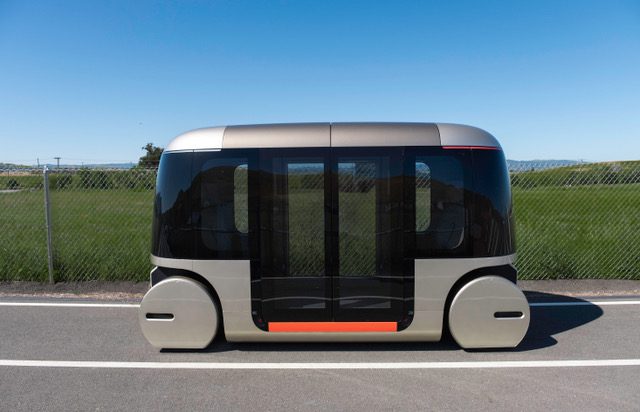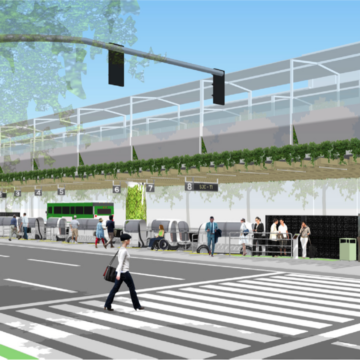A decision is near on whether to proceed with a futuristic transit system between San Jose’s airport and train station downtown, five years after officials started soliciting partners to build it.
San Jose transportation officials told the city’s Transportation and Environmental Committee Monday they are still determining whether an autonomous transit connector of electric vehicles on a guideway is financially feasible. They said one concern is an up to $40 million payment the city might have to make if it moves past an initial feasibility study to design work on the 3-plus-mile connector project.
The connector would transport passengers between San Jose Mineta International Airport and Diridon Station in four-seat vehicles that look like mini-buses, separated from traffic by an exclusive guideway. A fleet of several hundred vehicles would move users at 30 mph between the airport and train station in approximately 10 minutes.
The San Jose City Council approved an agreement with a consortium of companies in March 2023 to study the building of the estimated $500 million airport connector. It first solicited proposals for the plan back in 2019.
The idea of the public-private partnership was to put the funding and operation of the system in private hands, minimizing the city’s financial risk. But minimizing financial risk doesn’t mean the city won’t have to cough up millions.
“The way funding in America and California works for transit projects is making it so that we would have to come up with $30 or $40 million to get through phase two,” Ramses Madou, division manager, planning, policy and sustainability for the San Jose Department of Transportation, said at the meeting.

Bringing down costs
Madou said the city is trying to lower the cost by seeing if it can reduce that phase of the project, expected to take several years, into smaller chunks. He also said he hoped the city could receive state and federal funds for the project.
It’s unclear why the city would have to put up the money since private companies would build and collect fares on the system, keeping any profit.
“In this public-private partnership, the burden of the cost does not fall solely on either side,” Colin Heyne, city transportation spokesperson, told San José Spotlight.
The decision on whether to enter the design phase could come in several months.
Madou said the transportation department plans to make a recommendation by late summer or early fall on whether or not to proceed with the connector project. He said it would then be up to the city council to decide. Councilmembers are expected to consider the matter in the fall.
While the city had originally hoped the connector could be built for $500 million, those costs are also increasing.
Madou told San José Spotlight the $500 million to build the system was in 2022 numbers, without figuring out factors such as inflation, a rise in interest rates and increases in design costs. He said new cost estimates are being studied.
Another issue officials are weighing is are there enough airport passengers to justify spending $500 million or more to build the connector.
SJC passenger numbers reached 12 million in 2023, down from a peak of 15.6 million passengers in 2019 before the pandemic.
“A lot of work needs to go into making sure we get the right numbers if we’re going to be investing so much money from the public side,”Madou said.
City officials began their push for a high-tech airport to train station connector in earnest in July 2019 at a time of unprecedented airport passenger growth.
In its current configuration, the transit system will go from Terminal B at the airport to Diridon Station, but Madou said officials are looking at whether the system could also connect Terminal A and long-term parking. He said other intermediate stops are also being considered between SJC and Diridon.
Those connections, however, would add to the cost of the project, he said.
Even if city officials decide to abandon the project, it will cost them money.
Financial obligations
The 2023 agreement between the city and several partners, including funder Plenary Americas US Holdings and Glydways, which would build the autonomous vehicles, calls for a $500,000 payment by the city to end the deal.
The city also has an agreement to pay a multinational law firm Ashurst LLC up to $375,000 for its legal advice on the project during the initial feasibility study.
Glydways will display a prototype autonomous vehicle it has developed for the connector project outside San Jose City Hall at a yet-to-be-specified date in August, Madou said. It is the second prototype developed by Glydways.
Company spokesperson Craig Berman said the vehicle is 27.8 feet and slightly wider than the first prototype to accommodate wheelchair users, bicycles and passenger luggage.
He said the vehicle will also provide more room for those traveling with luggage and bicycles.
At Monday’s meeting, Councilmember David Cohen, chair of the committee, said the automated transit system would be so innovative that it could even attract tourists to San Jose.
“I’m certainly excited by new technology systems that are going to bring us into a new type of transportation system that I think is the wave of the future,” he said.
The only councilmember who expressed concern about the transit system at the meeting was Peter Ortiz. He said the private-public partnership for the airport connector could lead to the privatization of the entire San Jose transit system and the loss of transit worker jobs.
“Whenever innovation in any business begins to be mentioned, it usually means excluding jobs for working people,” Ortiz said.





